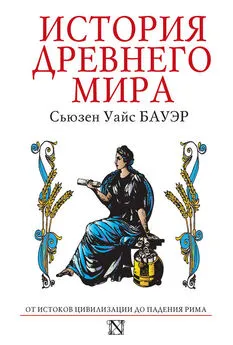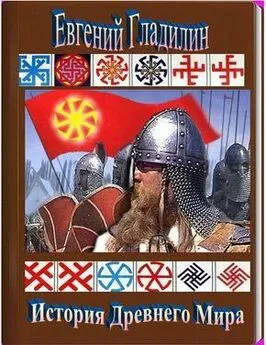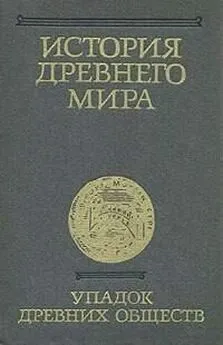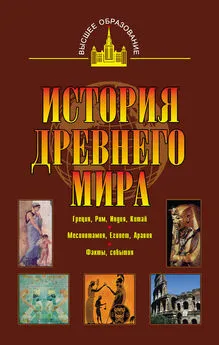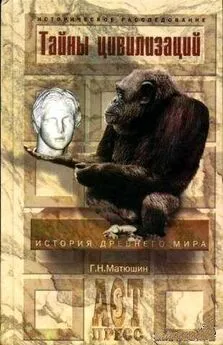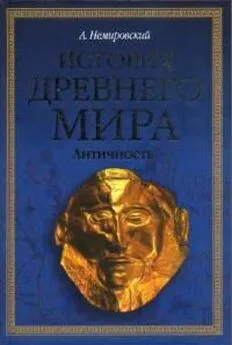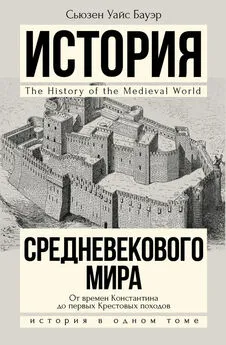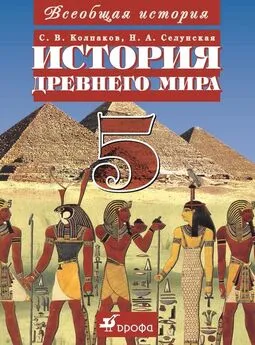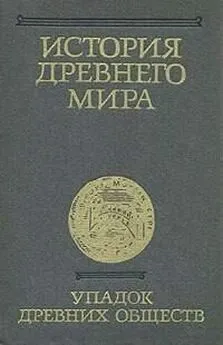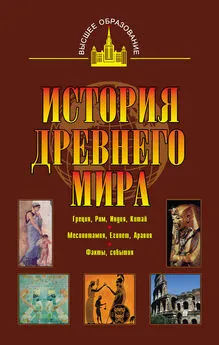Сьюзен Бауэр - История Древнего мира. От истоков Цивилизации до падения Рима
- Название:История Древнего мира. От истоков Цивилизации до падения Рима
- Автор:
- Жанр:
- Издательство:Литагент «АСТ»c9a05514-1ce6-11e2-86b3-b737ee03444a
- Год:2014
- Город:Москва
- ISBN:978-5-17-085809-5
- Рейтинг:
- Избранное:Добавить в избранное
-
Отзывы:
-
Ваша оценка:
Сьюзен Бауэр - История Древнего мира. От истоков Цивилизации до падения Рима краткое содержание
История Древнего мира – от самых ранних, научно документированных событий и до падения Римской империи.
В этой книге Сьюзен Бауэр выдвигает и доказывает интереснейшую теорию взаимодействия и взаимопроникновения культур самых разных западных и восточных цивилизаций.
Не просто сухие факты, но подробный и яркий рассказ о внешней и внутренней политике государств древности, об их литературе, религии и мифологии, повседневной жизни и системе управления.
Результатом становится потрясающая мозаика событий, свидетельств и документов, в которой в равной степени важен каждый элемент.
История Древнего мира. От истоков Цивилизации до падения Рима - читать онлайн бесплатно ознакомительный отрывок
Интервал:
Закладка:
ГЛАВА ШЕСТЬДЕСЯТ ШЕСТАЯ. ПЕРВОЕ РАЗГРАБЛЕНИЕ РИМА
1. Livy, Early History of Rome, 2.21.
2. Ibid., 2.24.
3. Mackay, p. 34.
4. Livy, Early History of Rome, 2.23.
5. Ibid., 2.32.
6. Ibid., 2.32.
7. Ibid., 3.35.
8. Ibid., 3–333.
9. Частично основано на: Oliver J. Thatcher, ed., The Library of Original Sources, vol. 3: The Roman World (1901), pp. 9–11.
10. Livy, Early History of Rome, 5.21.
11. Ibid., 5.32.
12. Ibid., 5.36.
13. Ibid., 5.38.
14. Ibid., 5.41.
15. Ibid., 5.47.
16. Cunliffe, pp. 21–22.
17. Livy, Early History of Rome, 5.55.
ГЛАВА ШЕСТЬДЕСЯТ СЕДЬМАЯ. ВОЗВЫШЕНИЕ ЦИНЬ
1. Ch’ien, p. 79.
2. Fairbank and Goldman, p. 54.
3. J. J. L. Duyvendak, trans., in his introduction to The Book of Lord Shang: A Classic of the Chinese School of Law (1928), p. 1.
4. Ch’ien, p. 108.
5. Cotterell, China, p. 53.
6. Shih chi 68, translated in Duyvendak, p. 14.
7. Ibid., p. 15.
8. Ibid., p. 16.
9. Shih chi 68, translated in Cotterell, China, p. 55.
10. Shu-Ching Lee, «Agrarianism and Social Upheaval in China», American Journal of Sociology 56:6 (1951), p. 513.
11. The Book of Lord Shang, translated by Duyvendak, p. 180.
12. Shih chi 68, in Duyvendak, p. 16.
13. Shih chi 68, in Cotterell, China, p. 57.
14. Shih chi 69, in Duyvendak, pp. 16–17.
15. Ibid., p. 17.
16. Ch’ien, p. 79.
17. Franz Michael, China Through the Ages: History of a Civilization (1986), p. 48.
18. Mencius, I.A.7.
19. Fairbank and Goldman, pp. 53–54.
20. Quoted in Michael, pp. 49–50.
21. «Giving Away a Throne», in The Complete Works ofChuang Tzu, translated by Burton Watson (1968), n.p.
22. «Discussion on Making All Things Equal», in Watson, The Complete Works ofChuang Tzu.
ГЛАВА ШЕСТЬДЕСЯТ ВОСЬМАЯ. МАКЕДОНСКИЕ ЗАВОЕВАТЕЛИ
1. Pomeroy et al., pp. 327–328.
2. Scene 1, in Aristophanes, The Birds and Other Plays, translated by David Barrett and Alan H.
Sommerstein (2003), p. 221.
3. Scene 3, Ibid., p. 257.
4. J. M. Cook, Persian Empire, p. 212.
5. Plutarch, Artaxerxes, in Plutarch’s Lives, vol. 2, The Dryden Translation.
6. Xenophon, The Persian Expedition (also known as Anabasis) 1.1, translated by Rex Warner (1972),
p. 56.
7. Эти подробности о Ктесии использованы Диодором Сицилийским, см. введение Джорджа Коквелла (George Cawkwell) к уорнеровскому переводу Ксенофонта: Xenophon, The Persian Expedition, p. 40.
8. Plutarch, Artaxerxes, in Plutarch’s Lives, vol. 2, The Dryden Translation, p. 646.
9. Xenophon, The Persian Expedition, 1.4.
10. Ibid., pp. 86–87.
11. Ibid., 4.5.
12. Ibid., 4.7.
13. Plutarch, Artaxerxes, in Plutarch’s Lives, vol. 2, The Dryden Translation, p. 658.
14. Clayton, pp. 201–202.
15. Hellenica, 5.19, in The Works of Xenophon, vol. 2, translated by H. G. Dakyns (1892).
16. Ibid., 5.23.
17. Clayton, p. 203.
18. J. M. Cook, Persian Empire, p. 48.
19. Panegyricus 50, in Isocrates, Isocrates II, translated by Terry L. Papillon (2004), p. 40.
20. Panegyricus 166, in Isocrates, p. 68.
21. Green, p. 14.
22. Ibid., p. 22.
23. Justin, The History, 7.5, in William Stearns Davis, ed., Readings in Ancient History, vol. 1 (Allyn and Bacon, 1912).
24. Green, pp. 23–24.
25. Alexander 6, in Plutarch, Greek Lives. 16. Alexander 3, in Plutarch, Greek Lives.
27. To Philip 15–16, Isocrates, p. 78.
28. Diodorus Siculus, 16.14.
29. Pomeroy et al., p. 389.
30. Justin, History, 8.8.
31. Alexander 10, in Plutarch, Greek Lives.
32. Частично эта история пересказана Диодором Сицилийским, а также Аристотелем в его «Политике» (перевод Рекхэма); см. также Guy MacLean Rogers, Alexander: The Ambiguity of Greatness (2004), pp. 31–34.
33. Alexander n, in Plutarch, Greek Lives.
ГЛАВА ШЕСТЬДЕСЯТ ДЕВЯТАЯ. РИМ УСИЛИВАЕТ ХВАТКУ
1. Livy, Rome and Ltaly: Books VI–X of The History of Rome from Its Foundation, 6.42, translated by Betty Radice (1982), p. 95.
2. Ibid., 6.42.
3. Edward T. Salmon, The Making of Roman Italy (1982), p. 5.
4. Polybius, Rise of the Roman Empire 3.24.
5. Mary T. Boatwright et al, The Romans: From Village to Empire (2004), p. 79.
6. Livy, Rome and Italy, 7.29, p. 135.
7. Ibid., 7.30, pp. 136–137.
8. Ibid., 8.6, pp. 164–165.
9. Ibid., 8.10–11, pp. 171–173.
10. Salmon, p. 40.
11. Livy, Rome and Italy, 8.14, p. 178.
12. Boarwright et al., p. 82.
13. Ibid., p. 84.
14. Diodorus Siculus, 9.9.
15. Soren et al., p. 91.
16. Ibid., pp. 90–91, 128–130.
17. Diodorus Siculus, 20.6–7.
18. Soren et al., p. 92.
19. Livy, Rome and Italy, 10.13, 304–305.
20. Ibid., 10.28, pp. 327–328.
ГЛАВА СЕМИДЕСЯТАЯ. АЛЕКСАНДР И ВОЙНЫ ДИАДОХОВ
1. Green, p. 114.
2. Plutarch, The Life of Alexander the Great, translated by John Dryden (2004), p. 13
3. Green, p. 118; Plutarch, Alexander the Great, p. 13.
4. Diodorus, Siculus, 17.5–6.
5. Ibid., 17.17.
6. Quintus Curtius Rufus, The History of Alexander (позднее сведена Джоном Ярдли), translated by John Yardley (2001), p. 23; также Arrian, The Campaigns of Alexander, 1.12, translated by Aubrey de Selincourt (1971).
7. Arrian, 1.15, p. 73.
8. Didodorus Siculus, 17.20; Arrian, 1.16.
9. Arrian, 1.17.
10. Rufus, 3.15–18, p. 27.
11. Arrian, 2.8.
12. Rufus, 3.12, p. 42.
13. Arrian, 2.15, p. 128.
14. Alexander 29, in Plutarch, Greek Lives, p. 339.
15. G. M. Rogers, pp. 124–145.
16. Arrian, 3.23.
17. G. M. Rogers, p. 135.
18. Arrian, 4.9.
19. Ibid., 5.4, p. 259.
20. Ibid., 5.9, p. 267.
21. Alexander 63, in Plutarch, Greek Lives, p. 369.
22. Rufus, 9.19.
23. Plutarch, Alexander the Great, p. 64.
24. Ibid., p. 67.
25. Rufus, 10.3.14.
26. Plutarch, Alexander the Great, p. 71.
27. Rufus, 10.6.13.
28. Plutarch, Alexander the Great, p. 72; also Diodorus Siculus, 18 and 19.
29. Rufus, 10.9.1.
30. Ibid., 10.10.7–8.
31. Sarvepalli Radhakrishnan and Charles A. Moore, eds. A Soureebook in Indian Philosophy (1957),
p. 198.
32. Vohra, p. 25.
33. Plutarch, Pyrrhus, in Plutarch’s Lives, vol. 1, The Dryden Translation, p. 520.
34. Plutarch, Demetrius, in Plutarch’s Lives, vol. 2, The Dryden Translation, p. 480.
35. Plutarch, Pyrrhus, in Plutarch’s Lives, vol. 1, The Dryden Translation, p. 537.
ГЛАВА СЕМЬДЕСЯТ ПЕРВАЯ. РЕЛИГИЯ ГОСУДАРСТВА МАУРЬЕВ
1. Keay, p. 88.
2. Thapar, Early India, p. 5.
3. Wolpert, p. 57.
4. Keay, p. 90.
5. Ibid., p. 91.
6. Thapar, Early India, p. 180.
7. Translated by Romila Thapar in Asoka and the Decline of the Mauryas (1998), p. 255.
8. Ibid., pp. 255–256.
9. Ibid., p. 256 and Keay, pp. 91–92.
10. Keay, p. 95.
11. Wolpert, p. 64. История Махинды основана на: Dipavamsa 7, 28–31; см. введение Макса Миллера к: Sacred Books of the East, vol. 10: The Dhammapada (1981).
12. Vohra, p. 25.
13. Ibid.
ГЛАВА СЕМЬДЕСЯТ ВТОРАЯ. ПЕРВЫЙ ИМПЕРАТОР, ВТОРАЯ ДИНАСТИЯ
1. Charles O. Hucker, China’s Imperial Past: An Lntroduction to Chinese History and Culture (1975),
p. 40.
2. Ibid., p. 41.
3. Ch’ien, p. 83.
4. Ibid., p. 123.
5. Ibid., p. 130.
6. Ibid., p. 123.
7. Fairbank and Goldman, p. 56.
8. Hucker, pp. 43–44.
9. Ch’ien, p. 140.
10. Ibid., p. 147.
11. Sima Qian, «The Biography of the Chief Minister of Qin», in Historical Records, translated by Raymond Dawson (1994), p. 31.
12. Sima Qian, «The Annals of Qin», in Historical Records, p. 69.
13. Jorge Luis Borges, «The Wall and the Books», in Daniel Schwartz, The Great Wall of China (2001), p. 10.
14. Ann Paludan, Chronicle of the Chinese Emperors: The Reignby-Reign Record of the Rulers of Imperial China (1998), pp. 18–19.
15. Ch’ien, p. 155.
16. Arthur Cotterell, The First Emperor of China (1981), p. 28.
17. Ch’ien, p. 156.
18. Ibid., pp. 161–162.
19. Denis Twitchett and Michael Loewe, eds., The Cambridge History of China, Volume I: The Ch’in and Han Empires, 221 BC – AD 220 (1986), p. 113.
20. Ibid., p. 117.
21. Sima Qian, Records of the Grand Historian: Han Dynasty I, translated by Burton Watson (1993), pp. 74–75.
ГЛАВА СЕМЬДЕСЯТ ТРЕТЬЯ. ВОЙНЫ СЫНОВЕЙ
1. Plutarch, Demetrius, in Plutarch’s Lives, vol. 2, The Dryden Translation, p. 465.
2. Diodorus Siculus, 21.12.
3. Plutarch, Pyrrbus, in Plutarch’s Lives, vol. I, The Dryden Translation, pp. 540–541, and Polybius, Rise of the Roman Empire, 2.43.
4. Polybius, Rise of the Roman Empire, 1.5, p. 45.
5. Ibid., 1. 7–12.
6. Ibid., 1.20, p. 62.
7. J. H. Thiel, A History of Roman Sea-power before the Second Punic War (1954), p. 63.
8. Polybius, Rise of the Roman Empire, 1.21, p. 64.
9. Polybius, The Histories, 1.75, translated by Evelyn Shuckburgh (1889), pp. 83, 85.
10. Polybius, Rise of the Roman Empire, 1.58, p. 105.
11. Livy, The War With Hannibal: Books XXI–XXX of The History of Rome from Its Foundation,
21.41, translated by Aubrey de Selincourt (1965), p. 66.
12. Polybius, Rise of the Roman Empire, 1. 63, p. 109.
13. Plutarch, Cleomenes, in Plutarch’s Lives, vol. 2, The Dryden Translation, p. 351.
14. Polybius, Rise of the Roman Empire, 5.34, p. 291.
15. Clayton, p. 211.
16. Polybius, Rise of the Roman Empire, 5.34, p. 292.
17. Ibid., 15.33, p. 491.
18. Josephus, Antiquities of the Jews, 12.3.3.
19. Polybius, Rise of the Roman Empire, 3.11, p. 189.
20. Polybius, Rise of the Roman Empire, 2.1, pp. 11–12.
21. Soren et al., p. 102.
22. Polybius, Rise of the Roman Empire, 3.20–21.
Читать дальшеИнтервал:
Закладка:
